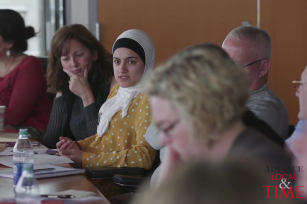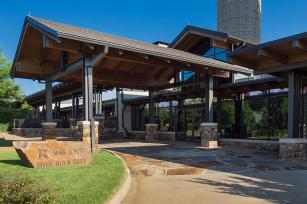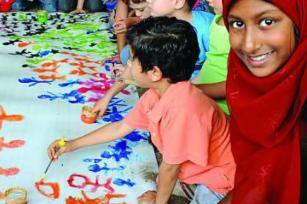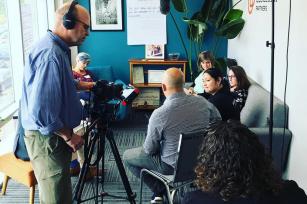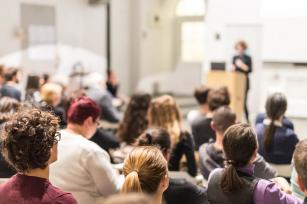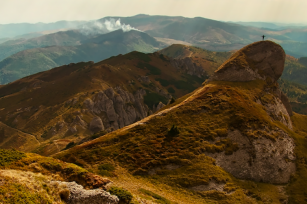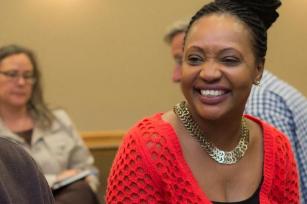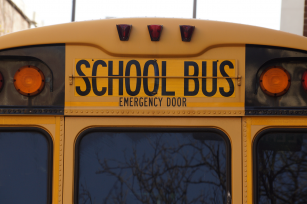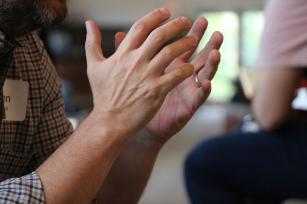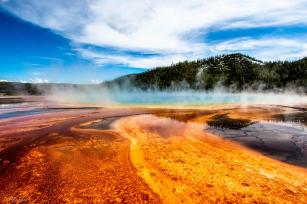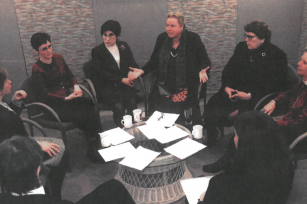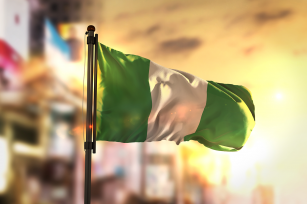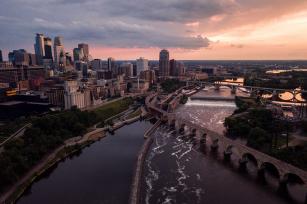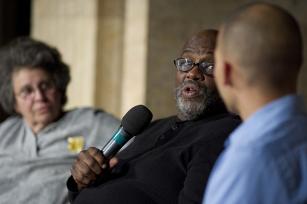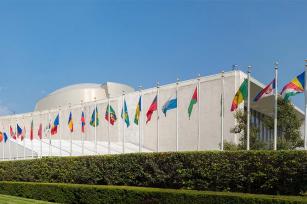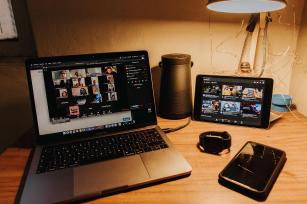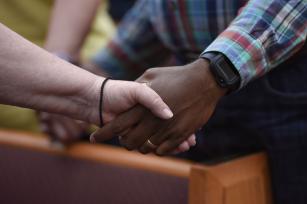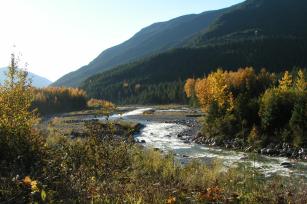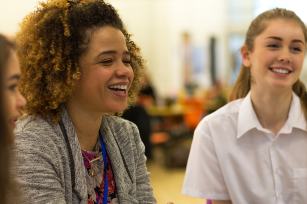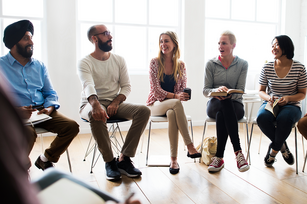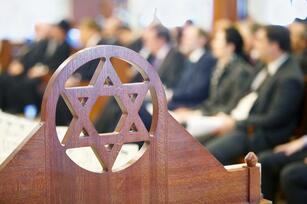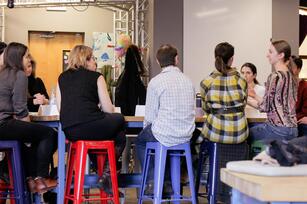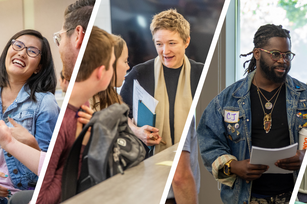
Breadcrumb
- Essential Partners
- Our Impact
- Impact Stories
- Building Trust Between Police and the Black Community in North Carolina
Building Trust Between Police and the Black Community in North Carolina
When Kate Dieter-Maradei—a court mediator, activist, and mother to two black children—found herself talking to an off-duty police officer at a mutual friend’s barbecue, she instinctively put her guard up.
Kate recognized how easy it would be to get into heated exchanges about Black Lives Matter, racial prejudice, and law enforcement. She didn’t feel equipped to go there.
At that moment, something shifted. With so much at stake for families like hers, Kate realized that she simply couldn’t avoid conversations like these, as difficult and emotional as they are. She also recognized that even professional mediators might need help engaging with people across painful, polarizing differences.
Kate and a group of likeminded colleagues envisioned a local alliance between activists, communities of color, and police departments, which could serve the community by creating spaces for meaningful dialogue about race and justice.
One of her colleagues mentioned Essential Partners.
Bringing Together Activists & Law Enforcement
No two communities are exactly alike, which means no two EP programs are exactly the same.
After talking with Kate about her hopes and the stakeholders who should be involved, EP led community focus groups to understand the community’s needs. The EP programs, shaped by that input, were designed in collaboration with activists, members of law enforcement, and local community members.
After that initial design and mapping process, EP launched a pilot training of activists and police officers. This equipped them to craft, organize, and facilitate dialogues about race and justice on their own, according to the needs of a given context.
These EP-trained stakeholders are working to find out, together, what it would take to build real and lasting trust between the Black community and members of law enforcement in the Raleigh-Durham area.
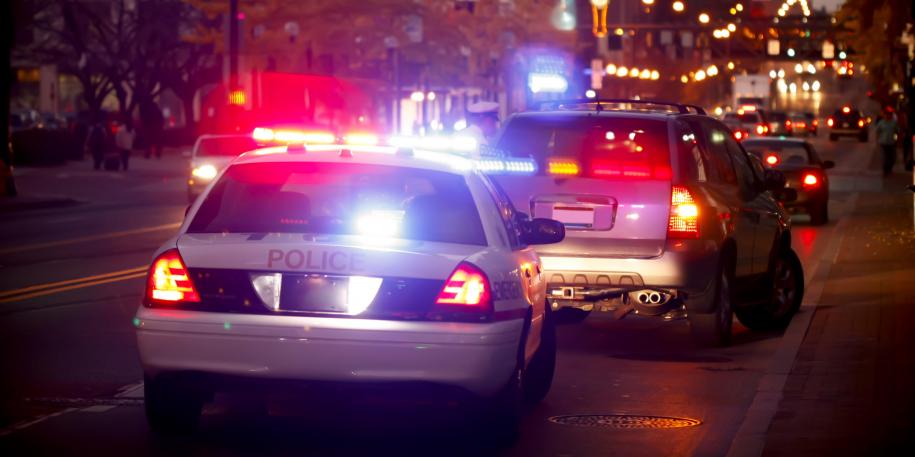
“As a black mother I participated because I want to save my son from harm, and I feared for our safety. I no longer have that fear—just a belief that my community is stronger and there are honest police officers who care about me and my son.”
Mary, Dialogue Participant
Raleigh, North Carolina
“My community is stronger”
EP practitioners have now trained dozens of facilitators, including members of local law enforcement, Black community stakeholders, and activists. These facilitators have, with their new skills and ongoing EP support, organized their own four-part dialogue series with people in the Raleigh-Durham community.
It is a testament to the care and investment of the local planning team and facilitators that the participants of these dialogues have been so moved by the experience.
One participant, Mary, felt a shift in her perspective on law enforcement. “As a black mother I participated because I want to save my son from harm, and I feared for our safety. I no longer have that fear—just a belief that my community is stronger and there are honest police officers who care about me and my son.”
“Essential Partners made a tough and often sensitive subject easier to discuss,” said Adren, a local attorney. “The material I learned has helped me develop a better way of communicating and resolving issues when I mentor African American youth.”
“I am very proud to have been a part of these discussions,” said Kitty, a local mediator, “but more are needed. The questions presented were well thought out and provoked me to take a deeper look at my own biases and how I may be contributing to problems. It left me wanting and needing more. This was a meaningful start to a discussion that must continue.”
Members of law enforcement spoke of forging new connections with citizens they hope to serve. One officer, surprised at having the chance to open up about his own experiences and concerns, said it was the first dialogue he’d participated in that wasn’t “a forum for everyone else to attack me just for being a cop.”
Their Work Continues
Thanks to a generous $25,000 grant from the American Arbitration Association Foundation, Essential Partners will have the ability to train twice the number of local facilitators in this multiracial alliance between law enforcement and the local community.
EP practitioners will also provide coaching and consultation as new public dialogues for the larger community are organized—particularly in the context of national protests around police violence and Black Lives Matter.
These conversations, led by local stakeholders, designed to meet specific local needs and concerns, stand as a monument to what is possible when communities are empowered to hold meaningful, open, vulnerable conversations about life-and-death issues with dignity and care.
Related Impact Stories
Testimonials

Nicki Glasser, Policy CoordinatorWhat surprised me was how much you could transform a relationship during a three-hour conversation.
Transformation Center, Massachusetts

Undergraduate StudentI have never heard people talk so openly about race, especially in a class setting. Everyone was respectful and honest at the same time. The dialogue structure helped me learn about my peers and helped me feel more comfortable than I ever have about discussing controversial issues.
Gordon College, Massachusetts

Program ParticipantI felt an amazing sense of accomplishment when the Essential Partners training ended; that I'd done something important for my community and something important for me.
Massachusetts

Andrew Wulf, PrincipalThe community dialogue was instrumental in helping us create a new policy around class rank. Though a controversial topic in the community, the dialogue EP helped us run ensured all voices were heard and valued. Regardless of how people felt with the final result, one parent summed it up best for us, ‘sometimes the process is more important than the outcome’.
Newburyport High School

Program ParticipantI read this comment from the 14th Dalai Lama: "Every change of mind is first of all a change of heart.” It seems appropriate for what we are doing.
Bayview, Michigan

Kate CellThe thing that always feels like magic to me—and I’ve used it in several meetings that I’ve had since—is how the practitioners start by setting out pacts or agreements.
Union of Concerned Scientists, Massachusetts

Program ParticipantThis is a different tool for engagement. It’s not about you, it’s about others. It involves the art of listening and sincerely talking from the heart
Interfaith Mediation Centre, Nigeria

Cricket Fuller, The Christian Science MonitorThis wasn’t a policy debate [about guns]. Instead, two people whose backgrounds and views diverged in almost every way possible shared a moment of honesty that struck at the heart of the matter.
Boston, Massachusetts

Belle AbayaWhat is special about Essential Partners' approach is that it promotes authenticity, reduces defensiveness, increases curiosity, and boosts connectedness.
The Conflict Resolution Group Foundation, Philippines

Seth Karamage, MediatorI am amazed at what came out—the way people shared their stories. This is not like a role-play; it really touched me.
Interfaith Mediation Centre, Nigeria

Meirav Solomon ’20Dialogue not only teaches you how to interact and understand more deeply those around you, it also teaches you more about the world around you and yourself. I think dialogue is super important to my growth as a student, a global citizen and a human being. I have learned to listen, I have learned to speak out, I have learned how to access my stretch zone (where I feel uncomfortable speaking but not turned off) and I have learned where my limits are.
Cary Academy, NC

Belle AbayaAuthentic conversations will lead people to reflect on their own thinking and transform their perspectives to include that of others.
The Conflict Resolution Group Foundation, Philippines

Undergraduate StudentI notice that my classmates take much more care when speaking about people who practice other religions. They make fewer assumptions, and they’re more careful with their words to make sure to avoid unintentional connotations.
Bridgewater College, Virginia

Matthew Sandikie, Project PartnerThis has been quite different from other discussions in Liberia about peace. While many processes have been about how to reform ex-combatants, this was about how we may hold our own views but live together peacefully.
Liberia

Kim Davidson, OmbudsI’ve gained not only confidence but tools. The Essential Partners training was worth every penny.
Oberlin College, Ohio

Program ParticipantBefore, I thought all dialogue that does not culminate in solution was considered equivalent to failure. Now I see that dialogue is a stage complete in itself.
Burundi

Linda Gryczan, MediatorInstead of demonizing and dehumanizing the other, we built a deeper connection. The fact that we disagree matters much less. It matters much more that we are neighbors in this community.
Montana Mediation Association

Bob Bordone, Expert and AuthorEssential Partners does the best work in the field of dialogue and communication.
Harvard Negotiation & Mediation Clinical Program, Co-Founder

Janet Harris, Winthrop Rockefeller InstituteThe learning we received from Essential Partners has helped us open up space for people to have difficult conversations in a different way. The more we do this, the more we realize that dialogue has to be a part of all our work.
Arkansas

Romeo McCauley, Project PartnerI learned that I can build relationships, that I can be connected to anybody who I want to be connected to, no matter how difficult it is
Liberia

Douglas Stone, Sheila Heen, and Bruce PattonWe owe a debt of gratitude to Laura Chasin and her collaborators at Essential Partners… From them, we have learned about the transformative power of telling one’s story and speaking to the heart of the matter.
Difficult Conversations
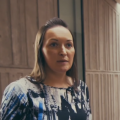
Louise O’Kane, Community Places[Essential Partners’] technique is used to explore contentious or divisive issues. So looking at renewable energy we thought this was an ideal opportunity to explore all the complexities of that issue. I found it a really useful method, and although this is the first time we’ve used it I am sure we’ll be using it again.
Northern Ireland, UK

Bill Scott, Project DirectorThere was a remarkable change in the way we were able to communicate with one another following the facilitated conversations.
Massachusetts Department of Mental Health

Anjali Bal, Associate Professor of MarketingOne of the things that we talked about was the ability to hear another person’s point of view, even if our minds aren’t changed. We have to remember that any sort of movement is movement. If we don’t acknowledge small movement, then we just stay on two different sides, and it’s all black and white, and we don’t hear each other.
Babson College, MA

Imam Sani IsahThrough this training, we will have more people in the stream of work that we do and become better equipped with the know-how, skills and techniques. But most important, together we will sow a seed that will germinate and become a source of the antidote to terrorism, fanaticism, bigotry and extremism.
Nigeria

Belle AbayaTogether, we married our ideas to create a dialogue model that took into consideration our young people’s particular needs, and our culture.
The Conflict Resolution Group Foundation, Philippines

Program ParticipantI did not anticipate having as many concrete takeaways as I do. I feel there is an immense practical application.

Peter Cooke, Immigration Dialogue ParticipantThere’s a real difference to people who are coming to meetings. They say, wow this is so different. They all said how people were more on the ball, more congenial. Now people see growing the economy as a way to unify the receiving community and immigrant communities.
New Hampshire

Program ParticipantI am now open to new views and can moderate my impulse to debate or persuade others of different views
Montana

Etionette Nshirmirimana, Burundian Master TrainerI realized that by using the “dialogue” approach, people could talk of what is deep in their heart, especially things that have harmed them.
Burundi

Rebekah Shrestha, SVPEssential Partners has played a catalytic role in our ability to facilitate dialogue time and time again, and we could not have done this work without them.
Belfer Center for Innovation & Social Impact and Office of Strategic Planning, 92NY

Program ParticipantThe highlight for me was the interconnectedness of the participants’ views, mutual respect, and range of experiences within the group
Montana

Program ParticipantThis is the best adult learning experience I have had in the past five years. I wanted to learn new skills—I did!

Veronique Cavaillier, Director of Eastern Trade CouncilI think Essential Partners' training should be mandatory in every legislature. I think it should be a requirement.
The Council of State Governments

Program ParticipantThis is a new idea, so many people speaking from their hearts. People can come together...if people can understand, they can change their hearts; then this can bring about more change.
Interfaith Mediation Centre, Nigeria

Janele Nelson, Mission DirectorIn these divisive times, Essential Partners has given my local YMCA and now the national YMCA a means to build bridges through dialogue, re-establishing foundations for constructive change to occur.
YMCA of Pierce & Kitsap Counties (WA)

Windor DorkoAs a former rebel, I really believe that if we had known about dialogue, perhaps we would not have had a civil war.
Liberia

Misty Stoll, School Board TrusteeThe Sheridan Community has changed in the best way since the Essential Partners training. The Center for a Vital Community has been holding monthly dialogues. I’m going to facilitate the upcoming one. What’s great is that we’re attracting a much more diverse group of participants. There are always the regulars who come, but now we’re also getting conservative Republicans to come as well—politicians come, even the Sheriff comes.
Wyoming

Misty Stoll, School Board TrusteeI ran for my local school board in 2018 and was elected. I use the skills in our meetings, whether I’m chairing the meeting or not. This makes the meetings much more productive. We don’t go over the same topics over and over again.
Wyoming
